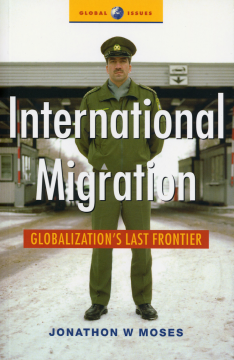
Additional Information
Book Details
Abstract
Jonathon Moses makes moral, political and economic arguments in favor of the free mobility of human beings across national borders. Pointing to the importance of immigration to the sucess of many nations, he shows that Europe itself now faces a falling population, and has over the past fifty years actively encouraged huge immigration from other countries. There is near consensus across the political spectrum that the free movement of goods and free movement of capital are good for economies, and therefore should apply to people as well.
'Makes a huge contribution to widening the migration debate.'
Birgit Jentsch, National Centre for Migration Studies, UK
'Carefully reasoned, forcefully presented, and passionately argued. Intellectual opponents of free international migration have their work cut out for them.'
Jeffry Frieden, Harvard University
'An excellent book - cogent, well-argued and comprehensive.'
Nigel Harris, author of Thinking the Unthinkable: The Immigration Myth Exposed
'This book stands out in the vast literature on globalization.It speaks with clarity and moral force, and is refreshingly provocative for the boldness of its ideas.'
Amit Bhaduri, Jawaharlal Nehru University
Professor Jonathon W. Moses has been at the Norwegian University of Science and Technology (NTNU) since 1993.
Table of Contents
| Section Title | Page | Action | Price |
|---|---|---|---|
| Cover\r | cover | ||
| Contents | vii | ||
| Preface | x | ||
| 1. Introduction | 1 | ||
| A timely argument… | 3 | ||
| … a good argument … | 7 | ||
| …but a difficult argument | 13 | ||
| 2. Two Paradoxes of Globalization | 18 | ||
| Economic Inequalities | 19 | ||
| Political Inequalities | 24 | ||
| Growing Demand for Migration | 30 | ||
| 3. Some Historical Perspective | 35 | ||
| Migration in the Long Arc of History | 37 | ||
| The Mercantilist Period | 42 | ||
| The Liberal Period | 45 | ||
| The New Liberal Period | 49 | ||
| Conclusion | 55 | ||
| 4. The Moral Argument | 57 | ||
| Mobility as a Universal Right | 59 | ||
| The Instrumentalist Argument | 72 | ||
| Conclusion | 76 | ||
| 5. A Political Argument | 78 | ||
| The Problem with Closed Borders: The Case of Apartheid | 82 | ||
| A Market-based Approach | 90 | ||
| The Political Benefits of Free Migration | 99 | ||
| 6. An Economic Argument | 105 | ||
| Host-country Benefits | 111 | ||
| Sending-country Benefits | 123 | ||
| International Benefits | 131 | ||
| Conclusion | 134 | ||
| 7. Who Opposes Free Migration? | 136 | ||
| Public Opinion | 138 | ||
| The Undying State | 143 | ||
| Diffuse and Particular Interests | 149 | ||
| 8. Questioning Conventional Wisdom | 164 | ||
| The Great Flood of Immigrants | 165 | ||
| Brain Drain | 173 | ||
| Migration’s Effect on Culture | 176 | ||
| The Challenge of Political Realism | 183 | ||
| Security Concerns | 189 | ||
| 9. Conclusion and Policy Responses | 195 | ||
| Policy Responses | 199 | ||
| Broadening the Debate | 207 | ||
| Notes | 212 | ||
| Preface | 212 | ||
| Chapter 1 | 212 | ||
| Chapter 2 | 213 | ||
| Chapter 3 | 219 | ||
| Chapter 4 | 221 | ||
| Chapter 5 | 224 | ||
| Chapter 6 | 229 | ||
| Chapter 7 | 234 | ||
| Chapter 8 | 237 | ||
| Chapter 9 | 241 | ||
| Suggested Reading | 243 | ||
| Index | 246 |
